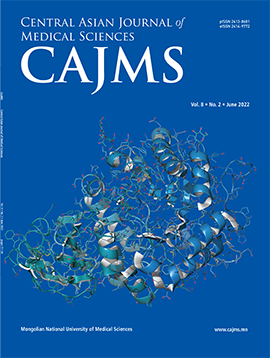Antioxidant Effect of GOYO-11 Against Aspirin-Induced Gastric Ulcer in Rats
DOI:
https://doi.org/10.24079/cajms.2021.06.008Keywords:
Antioxidants, Medicine, Mongolian Traditional, AntiulcerAbstract
Objectives: This study aimed to investigate the protective effects of GOYO-11 on aspirin-induced gastric ulcer formation. Methods: The prevention of aspirin-induced gastric ulcers was studied in 60 rats divided into 6 equally sized groups: healthy group (no aspirin), control group (aspirin-only), standard drug group (aspirin + omeprazole and bismuth), GOYO-11 (aspirin + GOYO-11 50 mg/kg, 100 mg/kg, 150 mg/kg, respectively). Results: The aspirin-only control group had distinctly attenuated activities of superoxide dismutase, catalase, glutathione peroxidase compared to the healthy group (p < 0.05). The control group showed a significant elevation in malondialdehyde levels compared to the healthy group (p < 0.05). The GOYO-11 high dose group had a significant elevation in superoxide dismutase levels compared to the control group (p < 0.05). The GOYO-11 middle dose group showed significant elevation in catalase, superoxide dismutase, glutathione peroxidase levels compared to the control group with a significant reduction in malondialdehyde level when compared to the control group (p < 0.05). Conclusions: GOYO-11 had a gastroprotective effect against aspirin-induced gastric ulcer rats and probably prevents ulcers by protecting the antioxidants, inhibiting lipid peroxidation (malondialdehyde), saving mucous glycoprotein, and decreasing the infiltration of inflammatory cells.
Downloads
274
Downloads
Published
How to Cite
Issue
Section
License
Copyright (c) 2021 Mongolian National University of Medical Sciences

This work is licensed under a Creative Commons Attribution-NonCommercial 4.0 International License.




